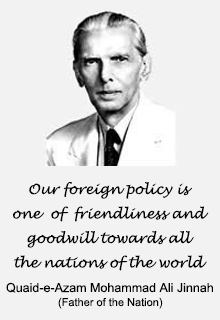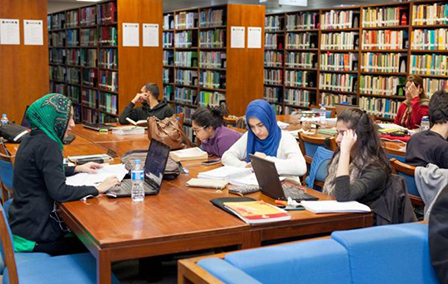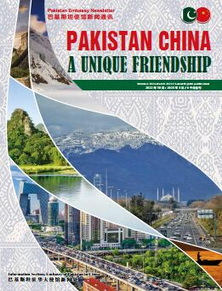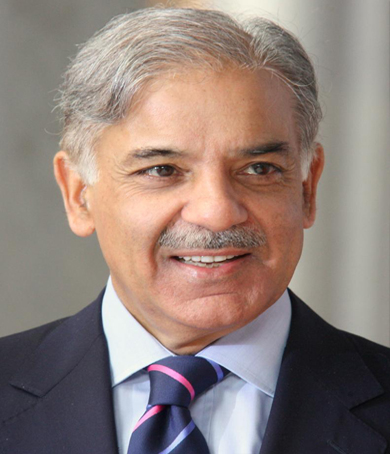

Pakistan Study Centers

Confucius Institute in Pakistan

Advisory for Students

Embassy College

Embassy of Pakistan Newsletter
Prime Minister

Mr. Muhammad Shahbaz Sharif
Prime Minister of the Islamic Republic of Pakistan
Mr. Muhammad Shahbaz Sharif son of (late) Mian Muhammad Sharif graduated from Government College, Lahore with a distinction.
He belongs to a distinguished business family of Pakistan. He served as President, Lahore Chamber of Commerce & Industry during 1985.
Later, he joined active politics and served as Member, Punjab Assembly during 1988-90 and as Member, National Assembly during 1990-93.
He was elected again as Member, Punjab Assembly in 1993 and served as Leader of the Opposition during 1993-96.
He became Member of Punjab Assembly for the third term in 1997 and was elected as Chief Minister of the province of Punjab and functioned as such till 1999 when as a result of coup, his government, along with the Federal Government, was toppled.
He played a leading role in the restoration of democracy in the country and was elected unopposed as Member, Punjab Assembly for a fourth time in 2008, and served as Chief Minister Punjab for the second time (from June 2008 to March 2013).
In the general elections held in May 2013, he was elected on three Provincial Assembly seats and on one National Assembly seat and was elected as Chief Minister of Punjab for the third time.
His brother, Mr. Muhammad Nawaz Sharif served as Provincial Member in Punjab Cabinet during 1983-84; as Chief Minister, Punjab twice during 1985-88 & 1988-90; and thrice as Prime Minister of Pakistan during 1990-93, 1997-99 and 2013-2017.
He is a dynamic and visionary political leader known for his strong and efficient administration. China described his hands-on, efficient and result-oriented administration as “Shehbaz Speed”.
As part of the Good Governance agenda, his priorities include provision of better health and education facilities to the public. A number of reforms in the economic, energy and social sector have been initiated under his leadership.
He presided over the completion of CPEC’s first power project namely Sahiwal Coal Power Plant in a record time of 22 months. He led the efforts to end the country’s energy crisis as part of Prime Minister Nawaz Sharif’s commitment to the nation and in a short span of five years, Pakistan was rid of the energy crisis. Three RLNG-power projects of about 5000 MW were installed in Punjab under his supervision in a record time.
The Metro Bus System, the country’s first ever environment-friendly rapid mass transit bus system, was established in record time in the city of Lahore, Multan and Rawalpindi/Islamabad providing state of the art traveling facilities to the citizens.
The Shehbaz Sharif government also conceived and implemented Pakistan’s first 27-km long Lahore Orange Line Metro Train project as part of China-Pakistan Economic Corridor. Upon completion, thousands of people are benefiting from the world-class, inexpensive and most efficient travel facility.
Social sector particularly health and education witnessed major improvements under his watch. In the education sector, his government’s reforms focused on upgrading existing schools, improving learning outcomes, and ensuring selection of hundreds of thousands of highly qualified educators purely on merit. He set up multi-billion Punjab Educational Endowment Fund to support bright but deserving students. So far more than 350,000 students have been awarded the scholarships to pursued education inside as well as outside of Pakistan. His novel idea of Daanish schools in the South Punjab as well as laptop scheme have been a game-changer in terms of the provision of free-of-cost quality education to the students of deserving families and making them part of digital revolution.
The Shehbaz government also launched a Zeevar-e-Taleem program that provided stipend to over five lac girls of South Punjab, enabling them to pursue education. He also personally led a unique education program for the children of brick kiln workers through the provision of stipends. The project resulted in the admission of about one lac out-of-school children back to schools.
In the health sector, his government divided the health departments into two sub-departments (specialised healthcare and medical education department and primary and secondary healthcare department to cater to the needs of rising populace. His government worked with DFID to produce tangible outcomes in the health and education sectors. The reforms in health sector include revamping and up-gradation of existing medical facilities, building of new hospitals and medical universities, South Asia’s first state-of-the-art Pakistan Kidney and Liver Institute and Research Center, the establishment of the country’s first forensic lab, to name only a few.
When dengue struck Punjab in 2011, it devoured hundreds of lives. True to his leadership style, Shehbaz Sharif rose to the challenge. He worked on war-footing in collaboration with Sri Lankan health authorities to devise a comprehensive anti-dengue policy. He personally oversaw the government’s measures to bring the virus under control. This success story is taught as a case study of effective, hands-on leadership in various institutions of public policy.
The Shehbaz Sharif government set up the country’s first Information Technology University (ITU) and made the use of information and communication technology the pivot of his governance reforms. The game-changing Punjab Land Records Management and Information System (LRMIS) introduced by the government did away with the centuries-old land record system and replaced it with technology-driven intervention that has protected land titles, ended land disputes, brought transparency and citizen facilitation and ensured land inheritance rights to women. The project has facilitated millions of people belonging to Punjab.
State-of-the-art Punjab Safe Cities Authority project, pioneered by Shehbaz Sharif in three Divisions, has aimed at improving the law enforcement capacity of the Punjab police. The technology-intensive project has proven its effectiveness for the crime prevention and helped track perpetrators of various terrorism incidents. It was also credited for the return of international cricket to Pakistan.
He set up Punjab Information Commission in compliance with Punjab Transparency and RTI Act 2013. The functions of the Commission that has the powers of a Civil Court include disposal of RTI appeals, the launch of RTI awareness campaign, and to help public bodies to implement the law.
Shehbaz Sharif took a personal interest in making sure that pro-women reforms are implemented in letter and spirit. From the provision of enhanced job quota to the enactment of inheritance rights to the introduction of comprehensive anti-harassment and women protection laws, Punjab under Shehbaz Sharif took the lead. The Violence against Women Center in Multan, South Asia’s first such project, which provided all facilities to women under one roof was set up under his watch.
From 2018 to date (April 2022), Shehbaz Sharif has served as the leader of the Opposition in the National Assembly of Pakistan.
As leader of the Opposition as well as the President of Pakistan Muslim League (Nawaz), he has been at the forefront of the struggle for democracy, human rights and freedom of expression in the country.
Shehbaz Sharif is a strong believer in the rule of law, and supremacy of constitution. He stands for a pluralistic society that respects diversity and considers public service to be the hallmark of his political philosophy.
Shehbaz Sharif is an avid swimmer and a cricket enthusiast.


.jpg)
.jpg)
.jpg)
.jpg)
.jpg)
.jpg)
.jpg)







